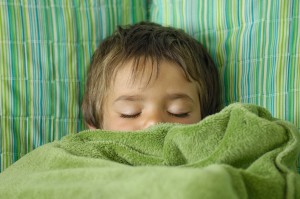Bedwetting
 A parent’s nocturnal nemesis, but part of the potty training process for some kids
A parent’s nocturnal nemesis, but part of the potty training process for some kids
Nocturnal enuresis is the medical term for bedwetting, or involuntary urination during sleep, and can be one of the most frustrating aspects of potty-training in children. It’s estimated that seven million kids in the United States wet their beds on a regular basis. Controlling bladder function during sleep is an individual matter, usually the last stage of potty-training, and is not considered a problem until after the age of seven. If bedwetting persists beyond the age of 6 or 7, you should consult your pediatrician.
There are both primary and secondary forms of bedwetting. With primary bedwetting, the child has never developed nighttime bladder control. The secondary form is less common and refers to bedwetting that occurs after the child has been dry during sleep for 6 or more months. Secondary bedwetting may be caused by psychological stress but may be the result of an underlying medical condition, such as constipation or urinary tract obstruction. Secondary bedwetting calls for a doctor’s evaluation.
Because bedwetting tends to happen during the first few hours of sleep, a good method of prevention is to make sure that your child goes to the bathroom before bed. The National Sleep Foundation offers these commonly prescribed behavioral methods for treating bedwetting.
- Establish a bedtime routine that includes going to the bathroom.
- Wake your child during the night before he/she typically wets the bed, and take him/her to the bathroom.
- Develop a reward system for encouragement, such as stickers for dry nights.
- Talk to your child about the advantages of staying dry, such as not having to wear diapers and becoming a “big kid”.
- Limit beverages in the evening – even those last minute water requests.
- Use a “bell-and-pad” which incorporates an alarm that goes off whenever your child’s pajamas or bed become wet during an accident. These systems can eventually teach your child to wake up before the bedwetting occurs.
When all else fails, your doctor may prescribe medication for bedwetting, either for short or long-term use. Although medication usually helps, bedwetting typically resumes once the child stops taking the medicine. As with any drug, it is important to monitor your child’s response to the medication.
There are products designed for children with nocturnal enuresis:
- Plastic or rubber liners placed between the sheet and mattress
- Disposable absorbent underpants
- Reusable absorbent underpants
- Sleeping bag liners
Although it can be frustrating for parents and embarrassing and stressful for the child who wets the bed, it’s important to remember that your child can’t help it, and no doubt wishes he/she could have a dry night too. Your child should never be punished. Talk to your doctor about treatment options. Following these coping tips may help:
- Talk to your child about how the bladder works.
- Do not talk about the bedwetting in front of other family members or the child’s friends.
- Be patient, understanding, and don’t forget the hugs.








